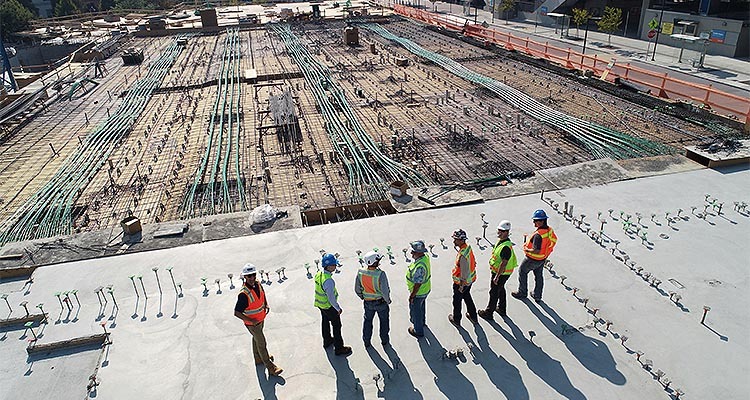Construction companies should embrace technology, as its influence on the construction management process grows
The UK construction industry is going through a period of rapid growth and transformation, accelerated in part by the onset of emerging technologies and new solutions that are bolstering efficiency and solving sectoral challenges. In 2022, the UK construction market size was $473.5 billion, and the sector is expected to attain an average annual growth rate (AGGR) of more than one per cent between 2024 and 2027. What this tells us is that adapting and embracing emerging technologies is critical to the long-term success of the sector and will play a key role in the UK’s economic growth.
The boom in artificial intelligence (AI), immersive technologies and machine learning (ML) has already created a buzz amongst construction professionals. At Digital

Catapult, we’ve identified a surge in interest about how these solutions could be integrated into construction companies’ operations. On the BridgeAI programme for example, an Innovate UK national programme seeking to stimulate the adoption of AI and ML technologies in construction, creative industries, transport, and agriculture, we continue to interact with leading construction companies about the challenges they face. One thing is clear from these conversations, and it’s that UK construction companies should embrace technology, as its influence on construction management increases.
Effective project planning with predictive analytics
A growing trend in the construction industry is the use of AI and ML for project planning with predictive analytics. More construction companies are exploring how they might integrate this technology into their operations, as it proves to be a viable solution for construction companies to effectively manage risk and optimise resources. AI and ML solutions leverage algorithms to analyse historical project data, meaning that it’s possible to identify potential risks, predict project delays and forecast cost-overruns.
The technology has also proven to be effective in resource optimisation, predicting the right amount of materials for a project, how much labour is necessary and what equipment is required for different phases, improving the project planning process and achieving cost savings. In 2022, research found that the highest perceived risk in the construction industry was the rising cost of materials, which had been attributed largely to the increase in the cost of fuel/ energy (48 per cent of respondents), inflation (48 per cent) and the increase in the cost of living (36 per cent).
With the rising cost of materials considered to be the largest risk to construction companies’ success, AI and predictive analytics continue to present an appropriate solution to mitigate this risk and maintain operational efficiency and business growth amid inflationary pressures. AI is already proving its value in construction and will continue to do so. Construction companies should prepare to embrace these solutions, as AI’s influence grows and gives those that are willing to embrace it, a competitive advantage.
Transforming quality control and defect detection
Construction management is being further transformed by the use of AI and ML to improve quality control and defect detection, improving safety, accuracy and efficiency while minimising cost for construction companies. There is growing demand for construction companies to mitigate structural deficiencies, as pressure mounts on them to pay to fix structural problems that were caused or missed during the construction management process. This has ignited a growing trend of AI being leveraged to power computer vision systems that can analyse images and videos from construction sites. From this analysis, the systems can identify defects, structural issues, or deviations from design plans, helping construction companies to have real-time quality control.
 Last year, data collected by the Scottish government was said to have recorded 1100 instances of items falling from buildings in two years, demonstrating the problem with structural building issues and the likely cost for subsequent remedial work. AI-powered solutions help to prevent this, and at Digital Catapult we are continuing to explore how AI can be converged with other emerging technologies like immersive technology, to transform the construction management process.
Last year, data collected by the Scottish government was said to have recorded 1100 instances of items falling from buildings in two years, demonstrating the problem with structural building issues and the likely cost for subsequent remedial work. AI-powered solutions help to prevent this, and at Digital Catapult we are continuing to explore how AI can be converged with other emerging technologies like immersive technology, to transform the construction management process.
A growing number of inspectors can now use virtual reality (VR) headsets to take virtual tours of construction sites from the comfort of their offices. This allows for immersive experiences where they can navigate through the entire site, examining structures, equipment, and potential issues in a highly realistic 3D environment, further improving the construction management process, and increasing safety and efficiency.
As these solutions are increasingly adopted by construction companies, more businesses should be prepared to embrace AI and emerging technologies, or risk falling behind in a rapidly changing industry. Such adoption would also naturally lead to increased digitisation and digital transformation which in turn will help organisations gain better value out of the emerging technologies and make the adoption more cost-effective.
The UK construction industry is undergoing a rapid transformation, driven by the integration of emerging technologies, and sustained success lies in the adoption of AI and ML. Programmes like BridgeAI at Digital Catapult demonstrate the crucial role of technology in addressing challenges faced by leading construction companies. As the industry embraces these innovations, construction companies will gain a competitive advantage and reshape the future of construction management, but only if they are committed to embracing this technology as its influence increases. Any company interested in learning more about BridgeAI, should visit https://www.digicatapult.org.uk/expertise/programmes/programme/bridgeai
By Hema Ramamoorthy
For a list of the sources used in this article, please contact the editor.
Hema Ramamoorthy is Data and AI Lead at Digital Catapult, the UK authority on advanced digital technology. Bringing together industry leaders, researchers and start-ups, we accelerate digital technology adoption to benefit the UK – breaking down barriers, de-risking innovation, opening up markets and responsibly shaping the products, services and experiences of the future.
